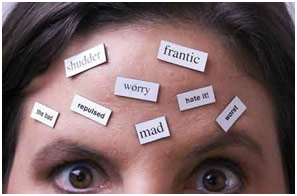
It is amazing how the seeds of character sown in childhood can have a long-term impact. Some of my grown up clients (aged 25 to 65) are being held back by some very old and poisonous trees that creep into everything they do. It is as if there is a space in the brain dedicated for each good trait. As soon as the area has been poisoned by weed killer, nothing good can grow there. If a person feels fundamentally inadequate, this becomes part of their identity. If anything were to suggest that they are adequate, they will subconsciously resist with all their might. The subconscious minds is a tricky thing and it takes time and courage to access and heal.
It is amazing how old and poisonous seeds can hold people back and creep into everything they do. It is as if there is a space in the brain dedicated for each good trait, and when the area is poisoned, nothing good can grow there.
Ronit Baras
Parenting with good intentions

If you have negative beliefs about yourself and you pass this on to your children, you are coming from your own fears and anxiety, from the poisonous seeds instilled in you that have now grown into trees. If you think that you are “not good enough” because you grew up with a parent who didn’t feel good enough, you may plant the “not good enough” seed in your kids. It is not intentional. No one means to hurt their kids.
The thing is, there is nothing “real” or “valid” or “true” in this idea of being good enough. Your parents created an external definition of “good enough” and you were just a kid. You believed them and accepted what they said. But what is “good enough”? Enough for who? Enough for what? What is enough? Who says when enough is enough? Based on who’s criteria? Who is ever enough? This is one of the most poisonous seeds a parent can plant. No parent purposely wants to pass this trait on to their children.
What to avoid when developing positive character traits in your kids
There are some things you have to keep in mind if you want to water good plants and avoid weed killers:
- Do not tell them the opposite of what you want them to be. Use positive language instead. For example: if you want your kids to be trustworthy, never, ever tell them they are “liars”. Don’t say, ” I can’t trust you”. It is better to say, “I need you to tell me the truth” rather than “you are a liar”.
- If your child has done something wrong, comment about the behavior, not about them. For example: if you know they are lying say, “what you just told me was not the truth” instead of “you are a liar and I can’t trust you“. You have said something about what they said, not about them.
- Complaining is not a very good parenting strategy. It makes you weak and helpless and not a good source of inspiration. Every complaint is a weed killer. Try to avoid complaining in general. It is not healthy for you either.
- Sarcasm is the worst poison of all. Avoid using sarcasm in your communication with your kids. We use sarcasm when we are afraid of what we have in mind so we say the opposite in a mocking way. Using sarcasm as a parent makes you seem weak.
- Fear is not the way to instil good thoughts. In fact, it does the exact opposite. Every time your child is afraid of you, he/she feels the spray of the weed killer. Fear diminishes your relationship with your kids and makes them think the things you do are frightening and negative. Even if your intentions are pure, they will try to avoid you.
- Force is not the way to instill good thoughts Forcing someone to do something is a display of power. It is another way to create fear. If you find yourself using your power to force your kids to do things, it does not make you appear strong in their eyes but weak. Some parents use lecturing as a way to convince their kids to do things. They lecture so much their child just gives up. Do not confuse “offering”, “suggesting” and “encouraging” with “convincing”, “making him understand” or ” making him do it”. Don’t get me wrong. There are times that we as parents need to set boundaries for our kids. “Sally, it is bed time and that is not up for negotiation”. But forcing your child to study law, under threat of writing them out of the inheritance is not going to earn you any brownie points. Every person on earth who went to study something he/she didn’t want knows the consequences of this. I promise they will not “thank you for it one day”.

- Do not play “fortune teller” with bad traits. “You’ll never be able to do such a thing”, “You would have been much better off if you chose medicine”. You can never tell what your children’s lives will be like in the future. No matter how many terrible consequences your mind can conjure, it does not make it true. Do not try to scare your kids into doing what you want by telling them that they will suffer if they don’t take your advice. Your suggestions and ideas come from your world, not from their world. You don’t really know whether studying medicine would be better for them. We have a good friend whose dad was so controlling he “forced” his son to study law. He was the biggest fortune -teller in the world. This guy is now over 40 years old and has turned his back on law entirely. He hates his dad. He hates his job and spends all his spare time working on his real dream job: fixing old cars.
Use the fortune telling technique to instill good things. For example: When my son was 12, he started experiencing some gender discrimination at school because he was dancing and singing and these were considered girly things. We wanted to encourage him to do the things he loves doing, even though not many boys in his school had the courage to the same. We told him that girls like guys who are coordinated and can sing to them, and that his girlfriend would be grateful for his dancing and singing one day. I am not a fortuneteller at all but this is one belief that can be only good for him.

During my parenting workshop, some of my clients suggested I make a list of phrases that parents say that function as weed killers so they can catch themselves saying it become more aware.
Join me next time for some phrases parents should never, ever say to their kids if they want to develop positive character traits in their children.
Happy parenting,
Ronit
This post is part of the series Helping Kids Build Character:
- Helping Kids Build Healthy and Powerful Character Traits
- Healthy and Powerful Character Traits for Children (A to G)
- Developing Good Character Traits for Children: H to Z
- Positive Character Traits for Children: Watering with Weed Killer
- How to Destroy Good Character Traits for Children: A to F
- How to Destroy Good Character Traits in Children: G-Z
- Kids’ Personality Traits: How to Change Them with Awareness
- Character Traits: Swapping the Bad for the Good












